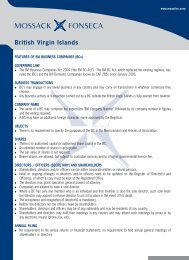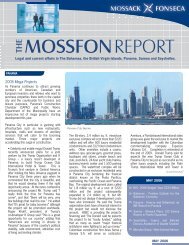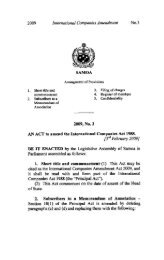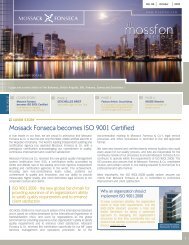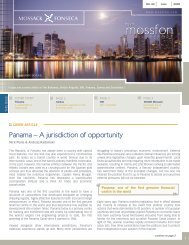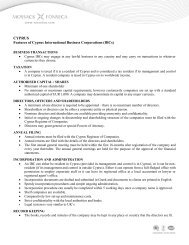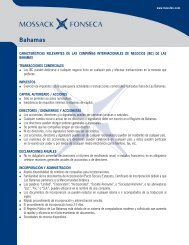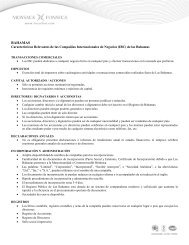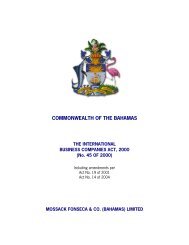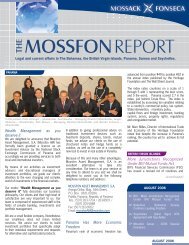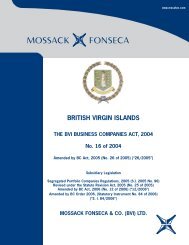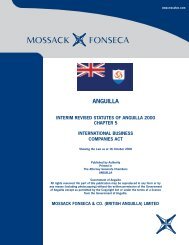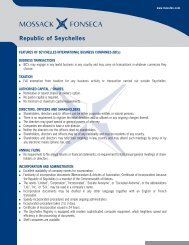Private Foundations.pdf - Mossack Fonseca & Co.
Private Foundations.pdf - Mossack Fonseca & Co.
Private Foundations.pdf - Mossack Fonseca & Co.
Create successful ePaper yourself
Turn your PDF publications into a flip-book with our unique Google optimized e-Paper software.
10<br />
Beneficiaries, nor for those of the Foundation <strong>Co</strong>uncil members, nor for those of any person, whether<br />
or not involved with the Foundation.<br />
3. A Foundation protects the Founder’s hereditary wishes.<br />
The Founder’s heirs shall have no right to revoke the creation of or the transfers made to the<br />
Foundation, nor may they object to the Foundation on the grounds of provisions that originate in<br />
forced heirship laws of the Founder’s domicile or of the Beneficiaries’ domicile.<br />
4. A Foundation is protected against the Founder’s creditors.<br />
The Founder’s creditors may dispute the contributions or transfers made to the Foundation, but only<br />
where both of the following two (2) circumstances occur: (i) The contribution constitutes an act of<br />
fraud against creditors and this fact is proven in a lawsuit; (ii) Three (3) years have not elapsed<br />
since the contribution or transfer.<br />
5. A <strong>Private</strong> Foundation is created as a body corporate.<br />
The registration of its Foundation Charter at the Public Registry of Panama grants corporate<br />
existence to a Foundation without need for any other legal or administrative endorsement. The<br />
registration also constitutes a form of publicity vis-à-vis third parties. <strong>Co</strong>nsequently, a Foundation<br />
may acquire and own property of all kinds, incur obligations and be a party in administrative and<br />
judicial proceedings of all kinds.<br />
6. A <strong>Private</strong> Foundation may not have profit making aims.<br />
Although a Foundation may not by virtue of the law engage in business, it may carry out business<br />
activities in a non habitual manner, that is, it may carry out activities for which there is no need to set<br />
up a corporate structure and obtain a business or industrial license. Thus, a Foundation may derive<br />
earnings from the sporadic sale of real property, it may have cash deposits, it may lend money in a<br />
non habitual manner, and it may invest in titles such as bonds, participation and shares, provided the<br />
earnings arising from them are applied solely towards the Foundation’s aims.<br />
7. <strong>Foundations</strong> may be revocable.<br />
The Founder may revoke the creation of a Foundation or the transfers made to a Foundation in any of<br />
the following circumstances: (1) Where the Foundation has been created to enter into effect after the<br />
Founder’s death; (2) Where the Foundation Charter has not been registered at the Public Registry;<br />
(3) Where the Foundation Charter is revocable; and (4) Where there is just cause for the revocation<br />
of donations in accordance with the relevant provisions of the Civil <strong>Co</strong>de of the Republic of Panama.<br />
8. A Foundation is exempt from all taxes.<br />
Provided that the contributions received by a Foundation and the income from such contributions<br />
originate outside the fiscal territory of the Republic of Panama, a Foundation shall pay no taxes,<br />
assessments, levies, rates or fees of any kind or denomination, save for a US$300.00 Annual<br />
Franchise Tax.<br />
In addition, any investment in titles and bank deposits, even if made within the Panamanian fiscal<br />
territory, shall not pay any taxes whatsoever.<br />
YA/Pub./10.2007



